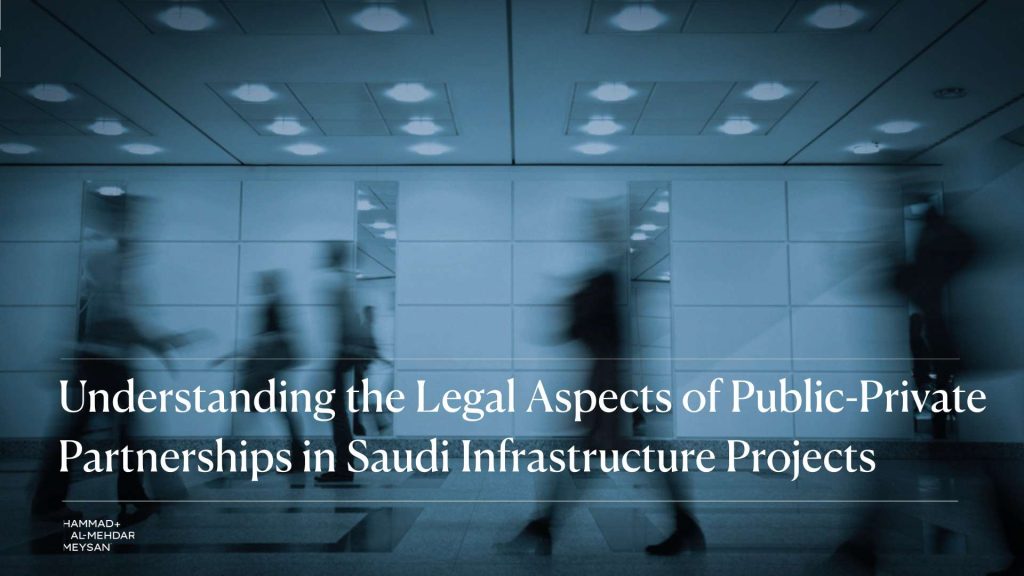
Public-private partnerships (PPPs) remain a cornerstone of Saudi Arabia’s infrastructure strategy, offering a powerful mechanism for achieving the goals of Vision 2030. The Kingdom’s push for economic diversification and a more dynamic private sector has accelerated PPP adoption across key sectors, from transport and energy to healthcare, education, and digital infrastructure.
Since enacting the PPP Law in 2019, Saudi Arabia has significantly reinforced its legal framework to support private sector engagement. In 2023 and 2024, the National Centre for Privatisation & PPP (NCP) released updated guidelines, standardised templates, and risk-allocation frameworks to streamline project procurement and implementation. The 2024 amendments to the Implementing Regulations of the Privatisation Law provided additional clarity on:
- Government guarantees and contingent liabilities
- Sector-specific eligibility criteria
- Dispute escalation protocols
- Foreign ownership and repatriation rights
The NCP also launched a new PPP Platform Portal in 2024 to enable faster bidder registration, project tracking, and real-time feedback loops during procurement, boosting transparency and investor confidence.
Strategic Role in Vision 2030 Execution
Infrastructure under Vision 2030 is more than concrete and cables—it’s about national transformation. PPPS are now directly embedded in megaprojects such as NEOM, The Line, Red Sea Global, and the Riyadh Metro expansion. These ventures combine long-term contracts with innovative financing structures, allowing Saudi Arabia to tap into global capital while retaining sovereignty and public accountability.
Key sectors currently leveraging PPP models:
- Healthcare: Hospitals, primary care centres, and diagnostics hubs
- Education: Schools, training centres, and digital learning platforms
- Utilities: Water desalination, power generation, and waste-to-energy plants
- Transport: Airports, ports, roads, and urban transit networks
- Digital infrastructure: Data centres and 5G backbone services
Risk Allocation and Legal Safeguards
Risk-sharing remains a critical element of PPP contract structuring. The updated 2024 NCP risk matrix provides more precise delineation:
Type of Risk: Typical Party Responsible
Construction Delays: in the Private Sector
Operational Failures: in the Private Sector
Demand or Usage Shared: depending on the project
Regulatory Changes: Government
Macroeconomic Shocks: Negotiated (e.g., inflation-indexed payments)
The government has also introduced force majeure relief mechanisms for pandemic-like events and geopolitical disruptions, a direct lesson from COVID-19 and recent Red Sea shipping tensions.
Legal Due Diligence and Investor Rights
Before reaching financial close, rigorous due diligence—legal, regulatory, environmental, and Shariah—compliant—is standardised. Notably, a 2023 SAMA Circular strengthened the legal treatment of sukuk and Islamic financing in PPP projects, aligning with Saudi Arabia’s growing Islamic finance ambitions.
Furthermore, the Saudi Government Tenders and Procurement Law (updated in 2024) now mandates pre-bid consultations for PPPS above SAR 500 million, improving alignment between ministries and bidders from the outset.
Dispute Resolution: Growing Trust in Local Forums
International arbitration remains common, but 2023-2025 saw a growing shift toward domestic resolution mechanisms. The Saudi Centre for Commercial Arbitration (SCCA), with its 2023 rulebook aligned with UNCITRAL and ICC standards, has positioned itself as a trusted forum for PPP-related disputes.
Recent reforms include:
- Bilingual (Arabic-English) arbitration proceedings
- Faster interim relief procedures
- Recognition of foreign arbitral awards under the New York Convention
Challenges and Areas for Reform
Despite progress, several challenges remain:
- Regulatory bottlenecks: Project approvals still face inter-ministerial delays in specific sectors.
- Bankability: Lenders often request stronger step-in rights and revenue guarantees, especially in greenfield projects.
- Capacity gaps: Smaller municipalities and regional authorities often lack the expertise to structure and manage PPPS effectively.
- Long-term predictability: Private investors seek greater clarity on how evolving ESG expectations, data regulations, and labour Saudization quotas will impact long-term operational costs.
The Road Ahead
In 2025, the Kingdom is actively working on a new PPP Law Amendment Bill (under consultation as of March 2025) to address gaps in secondary legislation, streamline project lifecycle management, and better align with international best practices. Moreover, regional cooperation through the GCC is being enhanced to allow cross-border project financing and shared infrastructure PPPS, especially in energy interconnectivity and logistics corridors.
